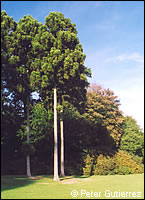Commission initiative examines impact of Europe's forests on climate change
The European Commission is investing 25 million euro in a collection of research projects that will study the biosphere's impact on carbon dioxide levels in the atmosphere. The project cluster, called CarboEurope, comprises 15 initiatives that will study the theory that the biosphere, in particularly forests, absorbs more CO2 than it produces, thereby acting as a huge carbon 'sink'. The results from the project's initial research points to a possible absorption rate of up to 30 per cent of EU annual industrial emissions. EU Research Commissioner Philippe Busquin says: 'Through the CarboEurope initiative, our best scientists across Europe are working together to be able to better quantify the capacity of forests to stock carbon. This is particularly important if we want to be able to meet the stringent Kyoto Protocol targets for CO2 reduction.' Carbon dioxide is the principal cause of global warming, and the reduction of CO2 levels in the atmosphere is a key objective of the Kyoto Protocol on climate change, to which EU Member States are both individual and collective signatories. As part of that reduction process, a clear understanding is needed of the roles of carbon sources and sinks in the biosphere: the CarboEurope projects aim to study these roles. Forests are able to both produce and absorb carbon dioxide. In the autumn, the decomposition of tree and plant matter releases CO2 into the atmosphere - with the arrival of spring and new growth, the process is reversed. Initial studies suggest that the age and biodiversity of a particular forest may be the key to whether or not it can absorb significantly more carbon dioxide each year than it produces, and is one area where further research is needed. 160 research institutions from more than 20 countries will be involved in the initiative, which is being funded under the energy, environment and sustainable development section of the Fifth Framework Programme. Other components of the overall project include new systems for ground-based measurements of the ecosystem, regional and continental mapping of atmospheric conditions using airborne equipment, and the creation of a framework that can coordinate and disseminate the relevant data more effectively. A presentation of the CarboEurope initiative was held in Valencia on 18 October, and included details on individual projects and demonstrations of the tools and equipment that have so far been developed. The project represents the first ever attempt to perform a comprehensive measurement and integration of terrestrial and atmospheric carbon sciences. This model is now regarded as a template for world research on the carbon cycle, and the USA, Japan and China are expected to launch similar initiatives in the future. Mr Busquin hopes that initiatives such as CarboEurope will highlight Europe's commitment to environmental protection: 'Over the next four years, the EU will devote 700 million euro to support research on global change and ecosystems. More research will help the EU promote its sustainable development agenda on the world stage,' he said.



